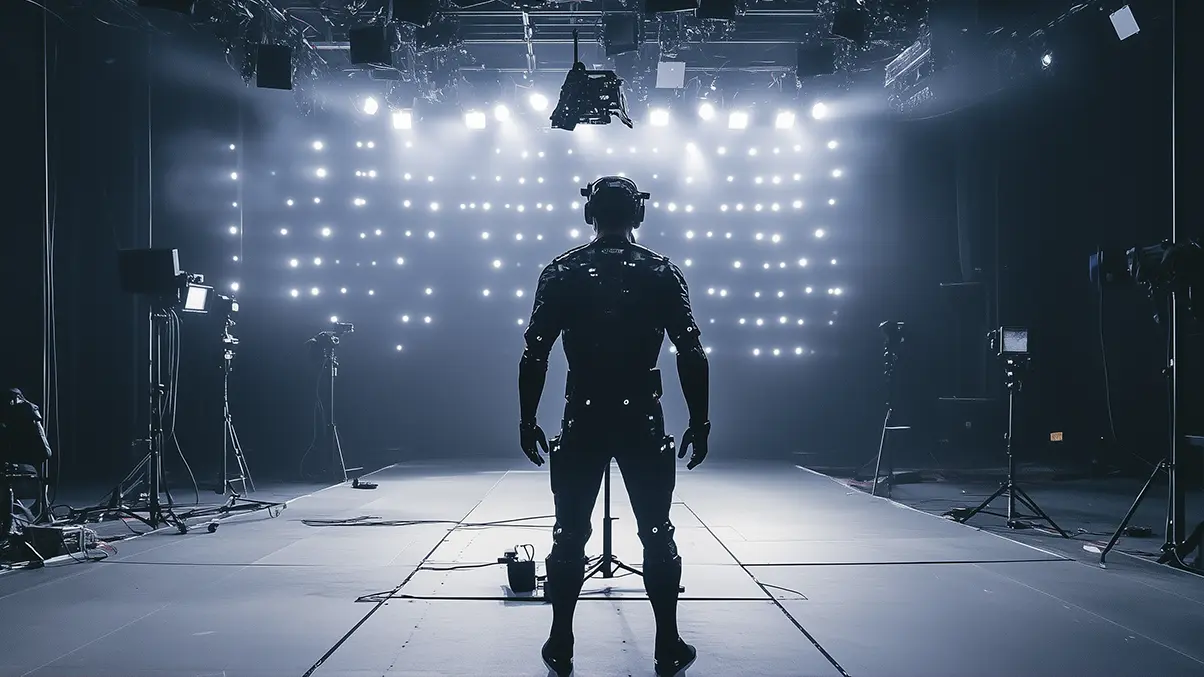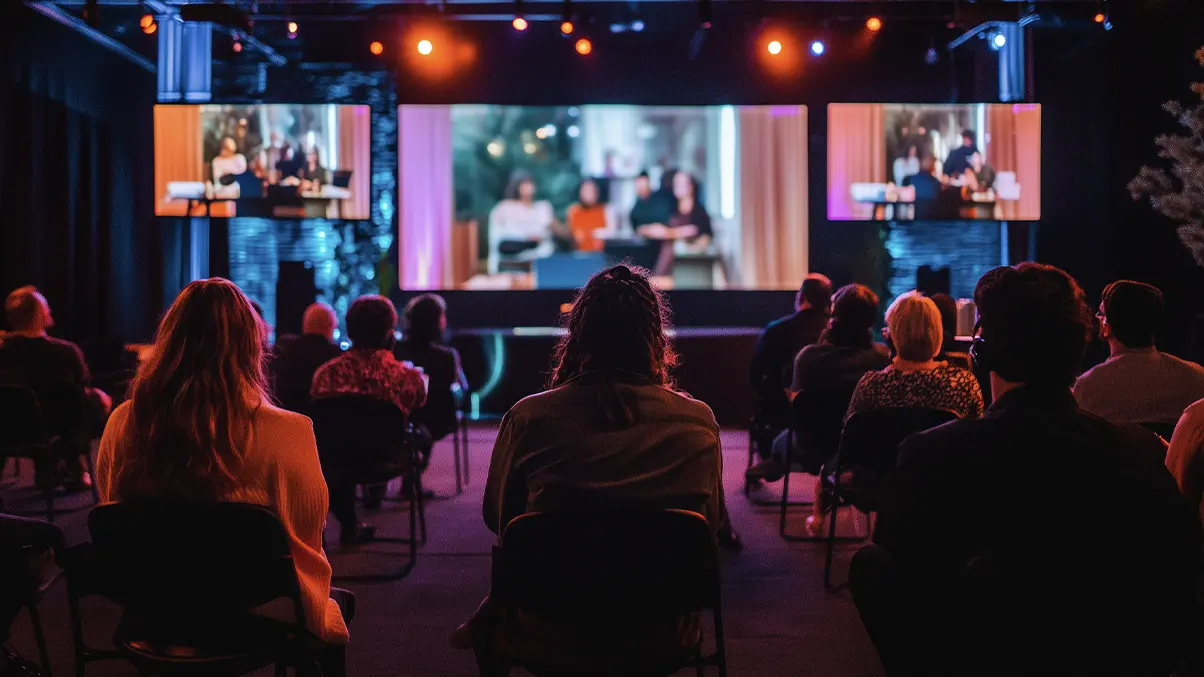What is virtual event production?

Virtual events — online gatherings hosted on digital platforms — have steadily risen in popularity and become a common form of community engagement in the last five years. Similar to traditional events, virtual events are designed to bring people together for a shared purpose. However, unlike traditional events, virtual events are not restricted by geographical boundaries and take place entirely online.
The process of organizing virtual events, known as virtual event production, has evolved into a complex task requiring specialized skills and expertise. Effective production ensures the seamless execution of an event, creating a smooth and engaging experience for participants.
Key components of virtual event production
- Strategy: Overseeing the event’s overall planning and direction, ensuring the goals and objectives align with the desired outcome.
- Logistics: Managing day-to-day operations, scheduling, and analyzing event performance metrics.
- Technology: Selecting and maintaining the appropriate digital platforms, troubleshooting technical issues, and offering technical support.
- Creative: Crafting the event’s design, including video production for virtual events, branding, marketing materials, and writing scripts and narratives.
- Talent: Booking and managing speakers, performers, and other key participants for the event.
Who are the key players in virtual event production?
A crucial player in virtual conference production is the event producer. The event producer is responsible for organizing and overseeing the entire event, from logistics to creative team management. They ensure the event runs smoothly and aligns with its objectives.
The production team for a virtual event typically consists of several key experts, each bringing specific skills to ensure the success of the event:
- Technicians and programmers are responsible for selecting and implementing the right event technology solutions, sourcing and setting up virtual event video production equipment, and overseeing technical production and engineering to ensure everything runs smoothly without technical hitches.
- The creative team oversees the artistic side of virtual event production, from scenes and expo layouts to developing its branding and overall theme. They additionally handle video production for virtual events, from narrative scripts to filming and editing.
- Producers are responsible for managing the day-to-day operations, handling talent booking, as well as sourcing keynote speakers, performers, and other event participants. Beyond that, they oversee event analytics, measuring performance and engagement to optimize future productions.
Since virtual event production is a multifaceted undertaking, it’s often recommended to collaborate with specialized production companies. These companies are well-equipped to guide clients through the entire virtual conference production process, ensuring the event meets expectations and delivers a compelling experience.
Video production for virtual events: a detailed breakdown

Virtual event video production is crucial in creating a seamless and engaging online experience. It begins with pre-production planning, where content, speakers, and event format are outlined to ensure smooth execution. During production, high-quality cameras, lighting, and audio equipment are used to capture content, while a team of technicians manages live streaming and video feeds. Post-production involves editing footage, adding graphics, and fine-tuning the sound for optimal viewer experience.
Video production for virtual events also includes ensuring platform compatibility, allowing seamless integration with various streaming services. Finally, technical rehearsals and live event monitoring ensure that the broadcast runs smoothly without interruptions. Effective virtual event video production ensures the event’s message is conveyed clearly, offering a professional and engaging experience for online audiences.
Key features of virtual event platforms
- A comprehensive technological solution for virtual event video production
- Customization and branding options to align with your event’s identity
- Pre-planned logistics for efficient operations
- Intuitive and user-friendly interfaces for easy navigation
- Analytics tools for tracking event performance and engagement
Choosing the right virtual event production platform
When selecting a virtual event production platform, consider the following factors:
- Scope and target audience: understand the needs of your audience and the scale of your event.
- Customization and design: evaluate the level of design flexibility and branding opportunities offered by the platform.
- Interactivity and accessibility: assess the platform’s ability to engage participants and accommodate different accessibility needs.
- Budget: determine which platform offers the best value for your budget while meeting your event’s technical and creative needs.
Virtual vs. hybrid platforms

A hybrid event combines virtual and in-person elements. It allows some participants to attend in person, while others participate remotely via streaming. Hybrid events offer the flexibility of both in-person and virtual interaction, using features such as chat rooms and breakout sessions.
However, hosting a hybrid event can present logistical challenges due to the need to manage both in-person and virtual components simultaneously. When deciding between a virtual and hybrid event, consider factors such as the geographical reach of your audience, the importance of in-person interaction, as well as your budget and available resources.
How to evaluate virtual event production services
When selecting a virtual conference production service, it’s essential to evaluate potential providers on the following criteria:
- Track Record: Look for a company with proven success in delivering high-quality virtual events.
- Communication: Choose a provider that maintains clear, timely, and open lines of communication.
- Technical Skills: Ensure the company has the necessary technical expertise to handle the platform and event setup.
- Creative Style: Assess the creativity of their previous projects to determine if their virtual event video production style aligns with your vision.
Assessing the quality of creative services

A strong creative direction is key to a successful event. When evaluating a production company’s creative services, review examples of their past work, such as their virtual event video production, to gauge the quality of their event presentation. High-quality creative services should result in an event that is engaging, well-designed, and memorable.
The importance of reviews and testimonials
Reviews and testimonials from previous clients provide valuable insight into a production company’s strengths and potential areas for improvement. While a large quantity of positive reviews is helpful, testimonials from repeat clients are particularly valuable, as they indicate long-term consistency and reliability.
FAQ
How much do virtual event planners earn?
Virtual event planners in the US earn between $51,000 and $75,000 annually, with a median salary of $62,000, according to sources like Glassdoor.
What is the salary of a virtual event project manager?
Virtual event project managers in the US typically earn between $73,000 and $123,000 annually, with a median salary of $93,000, based on data from Glassdoor.
How do you make an event virtual?
There are two ways to make an event virtual: one is to add virtual components to an in-person event (making it hybrid), and the other is to host the entire event online using a virtual platform. Consider your audience, event goals, and budget to determine the best virtual event production for you.
How does virtual event production work?
Virtual conference production involves managing all aspects of an online event, from platform selection and technical setup to content creation, logistics, marketing, and post-event analysis. This ensures a seamless, engaging experience for attendees.
What does event production involve?
Event production covers the planning and execution of all aspects of an event, from strategy and creative direction to talent management and technical coordination. It ensures that every element comes together to create a memorable experience for participants.



